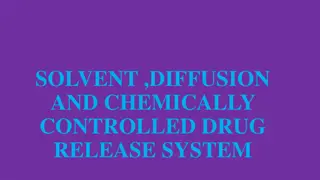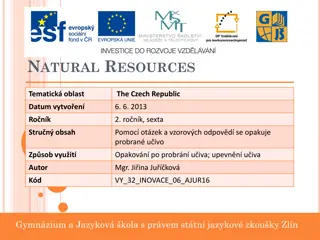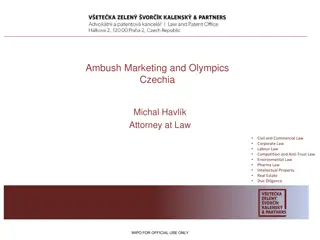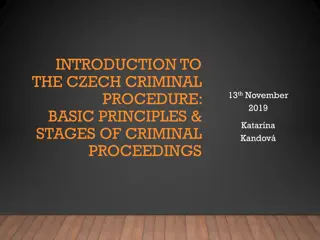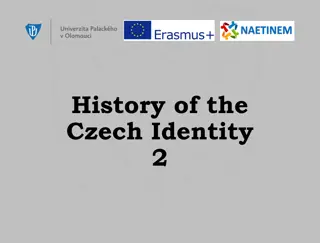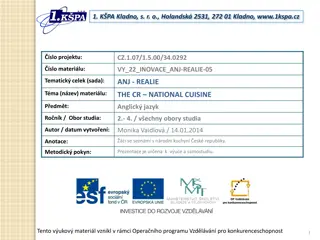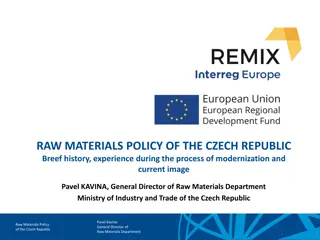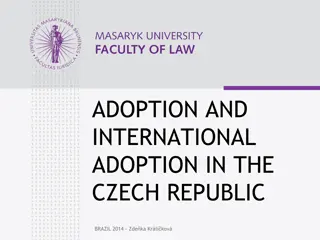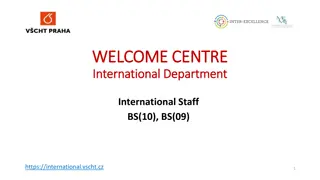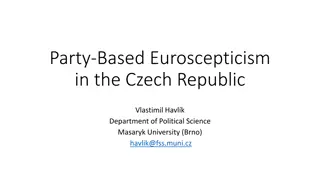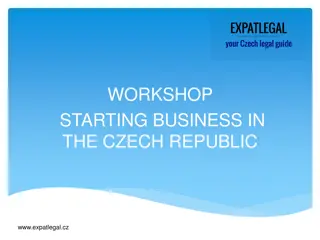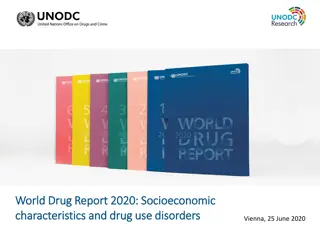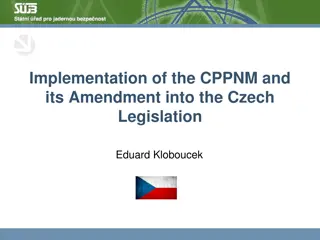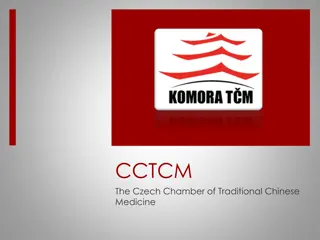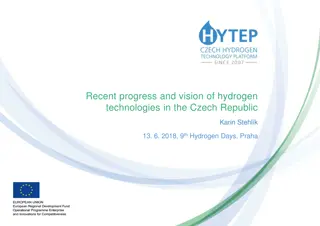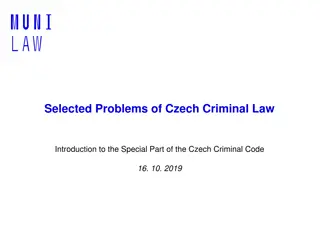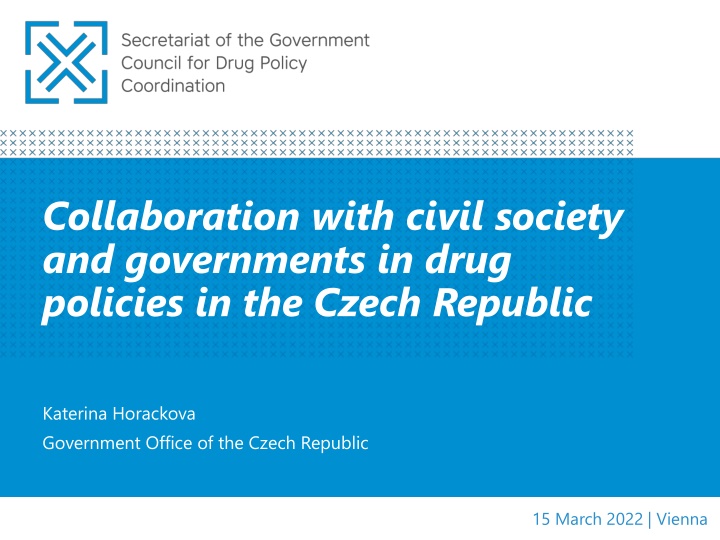
Collaboration in Czech Drug Policy
This presentation discusses the collaboration between civil society and the government in drug policies in the Czech Republic. It highlights the roles of key organizations such as the Governmental Council for Drug Policy Coordination and the Association of Drug NGOs.
Download Presentation

Please find below an Image/Link to download the presentation.
The content on the website is provided AS IS for your information and personal use only. It may not be sold, licensed, or shared on other websites without obtaining consent from the author. If you encounter any issues during the download, it is possible that the publisher has removed the file from their server.
You are allowed to download the files provided on this website for personal or commercial use, subject to the condition that they are used lawfully. All files are the property of their respective owners.
The content on the website is provided AS IS for your information and personal use only. It may not be sold, licensed, or shared on other websites without obtaining consent from the author.
E N D
Presentation Transcript
Collaboration with civil society and governments in drug policies in the Czech Republic Katerina Horackova Government Office of the Czech Republic 15 March 2022 | Vienna
Structure 1. Who we are? 2. Drug policy coordination and the involvement of CS 3. Challenges and critical aspects 4. Conclusion Czech Drug Policy
Governmental Council for Drug Policy Coordination (GCDPC) The main coordination body for drug policy issues 23 members Established in 1993, now situated at the Government Office Responsible for: Drug policy in the issues: illicit drugs, since 2014 for gambling, alcohol, tobacco, currently new issues as new technologies, psychoactive medicines, cannabis policy, Drafting, implementation, evaluation of the National drug strategy and action plans, Coordination of policy on national, local and international level, Funding of (drug) services state subsidies Quality assurance system of services (certification system) Monitoring of drug situation Czech Drug Policy
The Association of Drug NGOs is a voluntary, independent, professional and apolitical association that serves as umbrella platform and agency for / of nongovernmental organisations on the field of addictions General aims: contribute to improvement of policy planning and decision making process on the field of drug policy improvement of availability of relevant drug related information strengthen national network of services on drug demand reduction and international networks; lobby and promote common interests on behalf of NGO s Czech Drug Policy
Part 2: Drug policy coordination and the involvement of CS
What do we understand by civil society NGOs: highly professionalized health and social institutions providing professional health and social services for drug users have to undergo a process of certification every 4 years in order to get funding Usually employ high school educated people with specific training Professional organization in the field - Society for Addictive Diseases, Czech Association of Addictologists, Association of Social Service Providers, Professional Society for the Prevention of Risk Behaviour, Association of Non-governmental Organisations, Association of Hospitals of the Czech Republic, Society for the Treatment of Tobacco Dependence, Czech Coalition against Tobacco, research institutions (Department of Addictology - Charles University, National Institute of Mental Health) Patient/client organization in drug policy Alcoholics Anonymous, Recovery Czech Drug Policy
Involvement of CS into coordination mechanisms Participation of CS is a key aspect of drug policy (defined in the National Strategy) Become members of GCDPC since 2007 CS is invited to be part of working groups and committees on national and local level Special working group Addictological forum established in 2015 open forum for professional organization and CS with the aim to meet regularly with the secretariat of the GCDPC and national drug coordinator every 1-2 months, ad hoc meetings during crisis (eg. Covid-19 pandemic, refugees from Ukraine) Czech Drug Policy
Part 3: Challenges and critical aspects
What have we learned? We have decided to officially involve CS into decision making process because: they are those who bear/see the consequences of our decisions in practice, they are those who are the closed to the drug scene/drug situation and to the needs of clients, they can react on the drafts of drug policy and intentions before they are officially approved and correct them, they can provide direct feedback for the prime minister and ministers on what is the practice, what should be done, they provide balance to the view of state administration, help with lobbing for laws in parliament and for funding of drug policy. Czech Drug Policy
What have we learned? However: the CS is criticized for lobbying only for their own interest , they overprotect the drug users , are biased do not see the policy in whole context, even it is stated in the National Strategy they faced a strong discussion in 2014 whether the CS should be part of GCDPC, even they are part of working groups and committees their representation is not equal to state administration, their voice can be weak, it is always better when the CS is united into one strong umbrella organization that advocates for their needs. It is necessary in the long term to build mutual understanding and trust among the state institution and CS. Czech Drug Policy
Conclusion Partnership - active participation, contribution and involvement of whole spectrum of CS, namely NGOs Drug Services, academy or research organizations, regional representatives, umbrella organizations and expert associations are important part of implementation of relatively sustainable National Drug Policy. Some of them are formal partners in National Drug Policy as they are members of key decision making bodies on the central level, however in some cases also on regional level. Thank to involvement and active participation in implementation of drug policy, CS has direct possibilities to advocate harm reduction investment within drug policy coordination and decision making structures. Czech Drug Policy
Thank you for your attention horackova.katerina@vlada.cz

